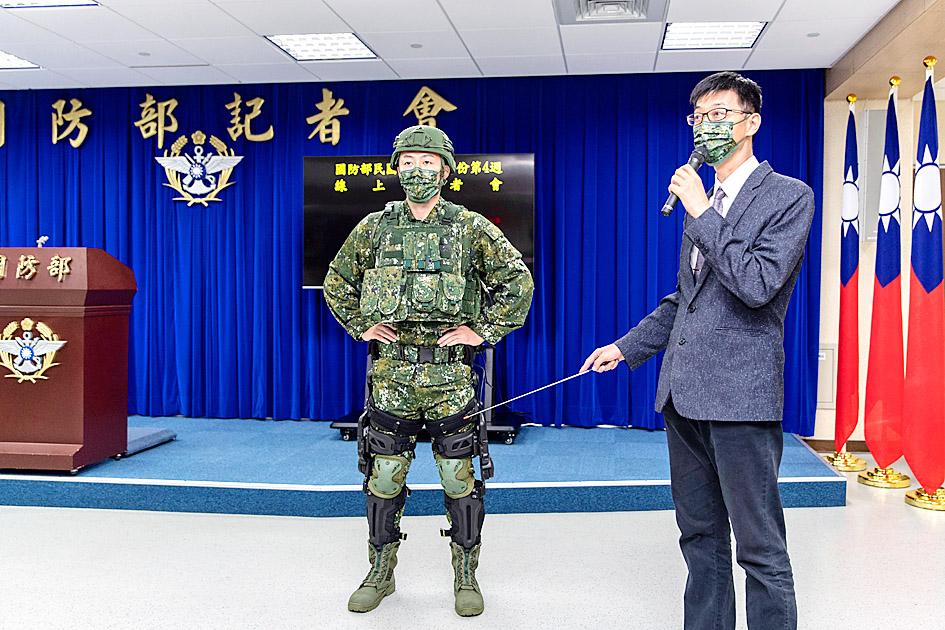The military yesterday unveiled a locally made powered exoskeleton suit, a mechanized wearable system designed to be used in wartime or during post-disaster rescue and relief missions.
The 10kg lower-body exoskeleton, which is designed to boost the strength and endurance of its users, can move at 6kph, said Jen Kuo-kuang (任國光), the project manager and a member of the military’s top research body, the National Chung-Shan Institute of Science and Technology.
The exoskeleton delivers the right torque at the right time to assist knee flexion and extension to reduce the energy needed to cross terrain, squat, or kneel for its wearers, and to increase mobility and reduce fatigue, Jen said.

Photo courtesy of the Ministry of National Defense
The exoskeleton’s lithium battery can run for six hours on a single charge, he added.
The institute has run tests on 105 soldiers to make sure the suit fits the average height and weight of Taiwanese, with minor adjustments being made based on the wearer’s body size, Jen said.
He did not provide an estimate on when the suit can be put into use by field units.
According to a budget proposal issued by the Ministry of National Defense, the military-use powered exoskeleton suit is part of a four-year NT$158 million (US$5.67 million) project running from last year to 2023.
The institute has completed the first phase of the project in designing the suit.
It will continue to modify the suit so that ultimately it can enable a user to carry a maximum load of 100kg when the four-year-project is completed, he added.
A source said the military is hoping the high-tech suits can be used during wartime and in post-disaster rescue and relief missions.
So far, only a handful of world powers, including the US, Japan, and Canada, are working on similar technology for military use, and their technology is not available at present for confidentiality reasons, which is why Taiwan needs to develop its own, the source said.
The project has learned from the US military’s experience in developing its own powered exoskeleton suit, the source said.
The military is working closely with the institute, a number of private medical technology, automation and robotic companies, and several local universities on the project, the source added.

A preclearance service to facilitate entry for people traveling to select airports in Japan would be available from Thursday next week to Feb. 25 at Taiwan Taoyuan International Airport, Taoyuan International Airport Corp (TIAC) said on Tuesday. The service was first made available to Taiwanese travelers throughout the winter vacation of 2024 and during the Lunar New Year holiday. In addition to flights to the Japanese cities of Hakodate, Asahikawa, Akita, Sendai, Niigata, Okayama, Takamatsu, Kumamoto and Kagoshima, the service would be available to travelers to Kobe and Oita. The service can be accessed by passengers of 15 flight routes operated by

Alain Robert, known as the "French Spider-Man," praised Alex Honnold as exceptionally well-prepared after the US climber completed a free solo ascent of Taipei 101 yesterday. Robert said Honnold's ascent of the 508m-tall skyscraper in just more than one-and-a-half hours without using safety ropes or equipment was a remarkable achievement. "This is my life," he said in an interview conducted in French, adding that he liked the feeling of being "on the edge of danger." The 63-year-old Frenchman climbed Taipei 101 using ropes in December 2004, taking about four hours to reach the top. On a one-to-10 scale of difficulty, Robert said Taipei 101

Taiwanese and US defense groups are collaborating to introduce deployable, semi-autonomous manufacturing systems for drones and components in a boost to the nation’s supply chain resilience. Taiwan’s G-Tech Optroelectronics Corp subsidiary GTOC and the US’ Aerkomm Inc on Friday announced an agreement with fellow US-based Firestorm Lab to adopt the latter’s xCell, a technology featuring 3D printers fitted in 6.1m container units. The systems enable aerial platforms and parts to be produced in high volumes from dispersed nodes capable of rapid redeployment, to minimize the risk of enemy strikes and to meet field requirements, they said. Firestorm chief technology officer Ian Muceus said

MORE FALL: An investigation into one of Xi’s key cronies, part of a broader ‘anti-corruption’ drive, indicates that he might have a deep distrust in the military, an expert said China’s latest military purge underscores systemic risks in its shift from collective leadership to sole rule under Chinese President Xi Jinping (習近平), and could disrupt its chain of command and military capabilities, a national security official said yesterday. If decisionmaking within the Chinese Communist Party has become “irrational” under one-man rule, the Taiwan Strait and the regional situation must be approached with extreme caution, given unforeseen risks, they added. The anonymous official made the remarks as China’s Central Military Commission Vice Chairman Zhang Youxia (張又俠) and Joint Staff Department Chief of Staff Liu Zhenli (劉振立) were reportedly being investigated for suspected “serious